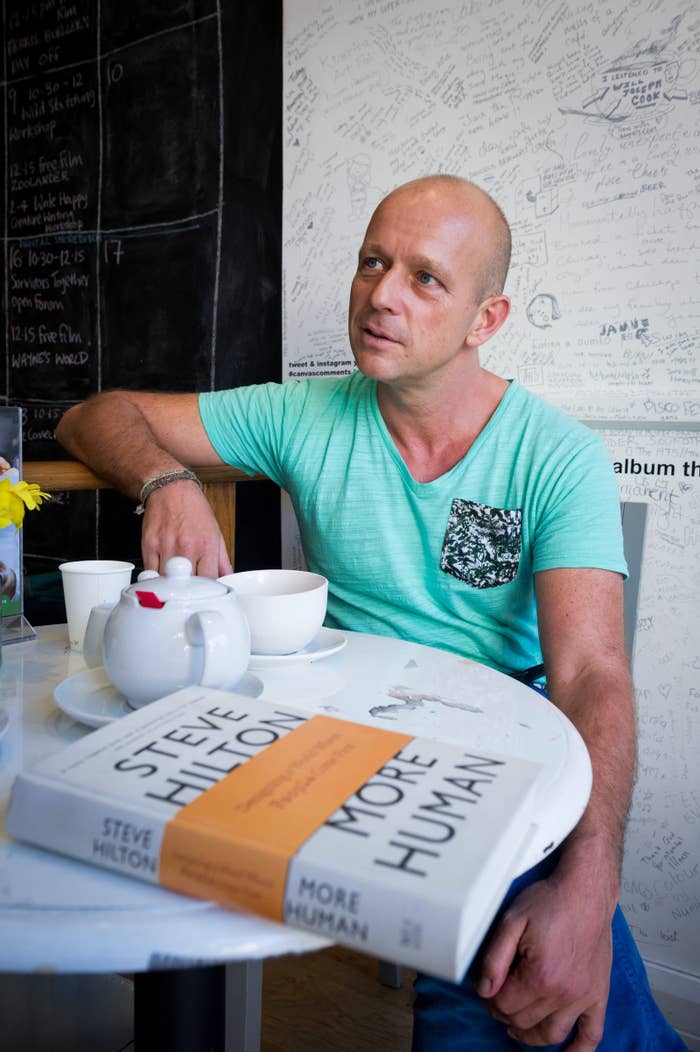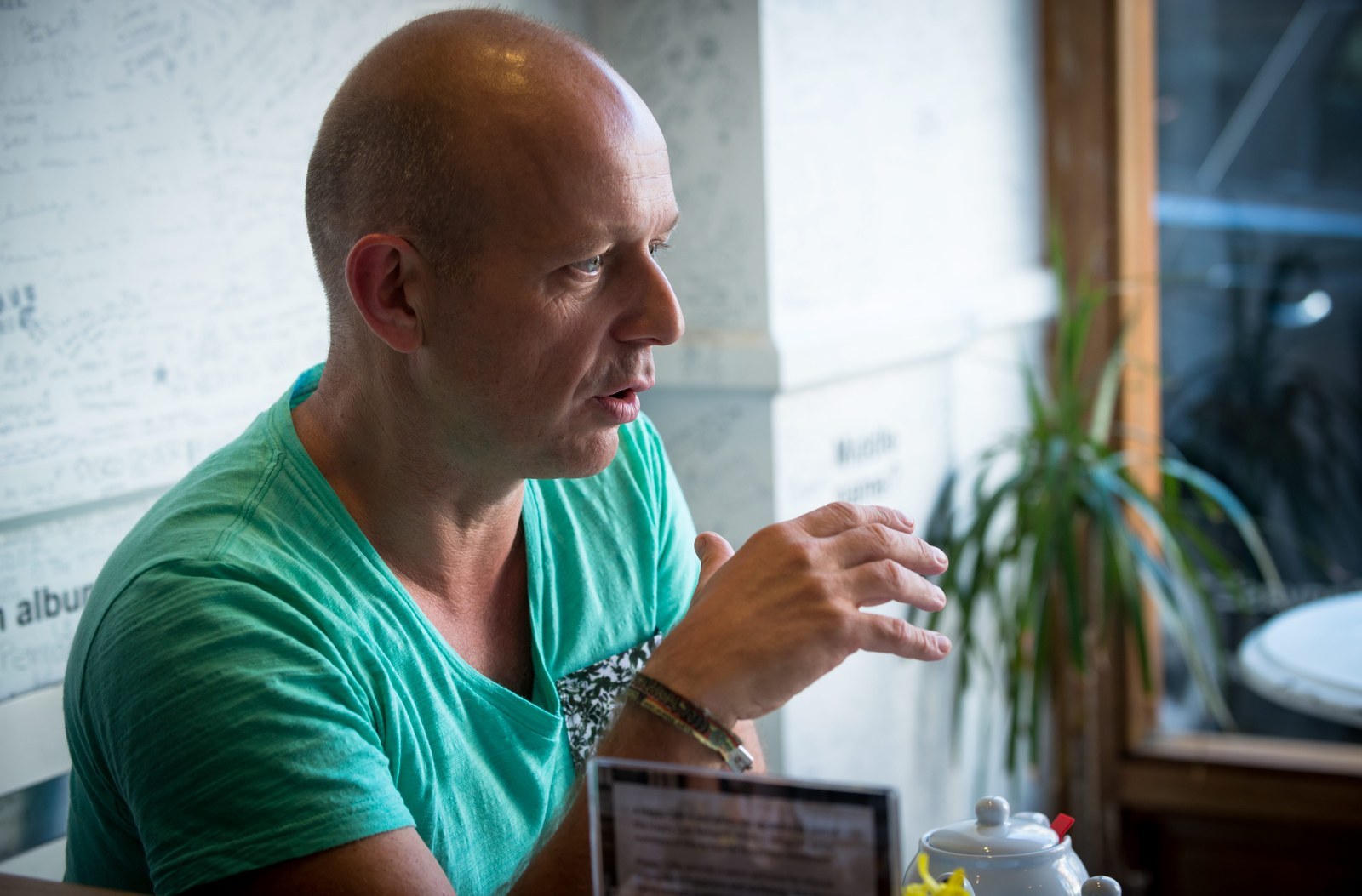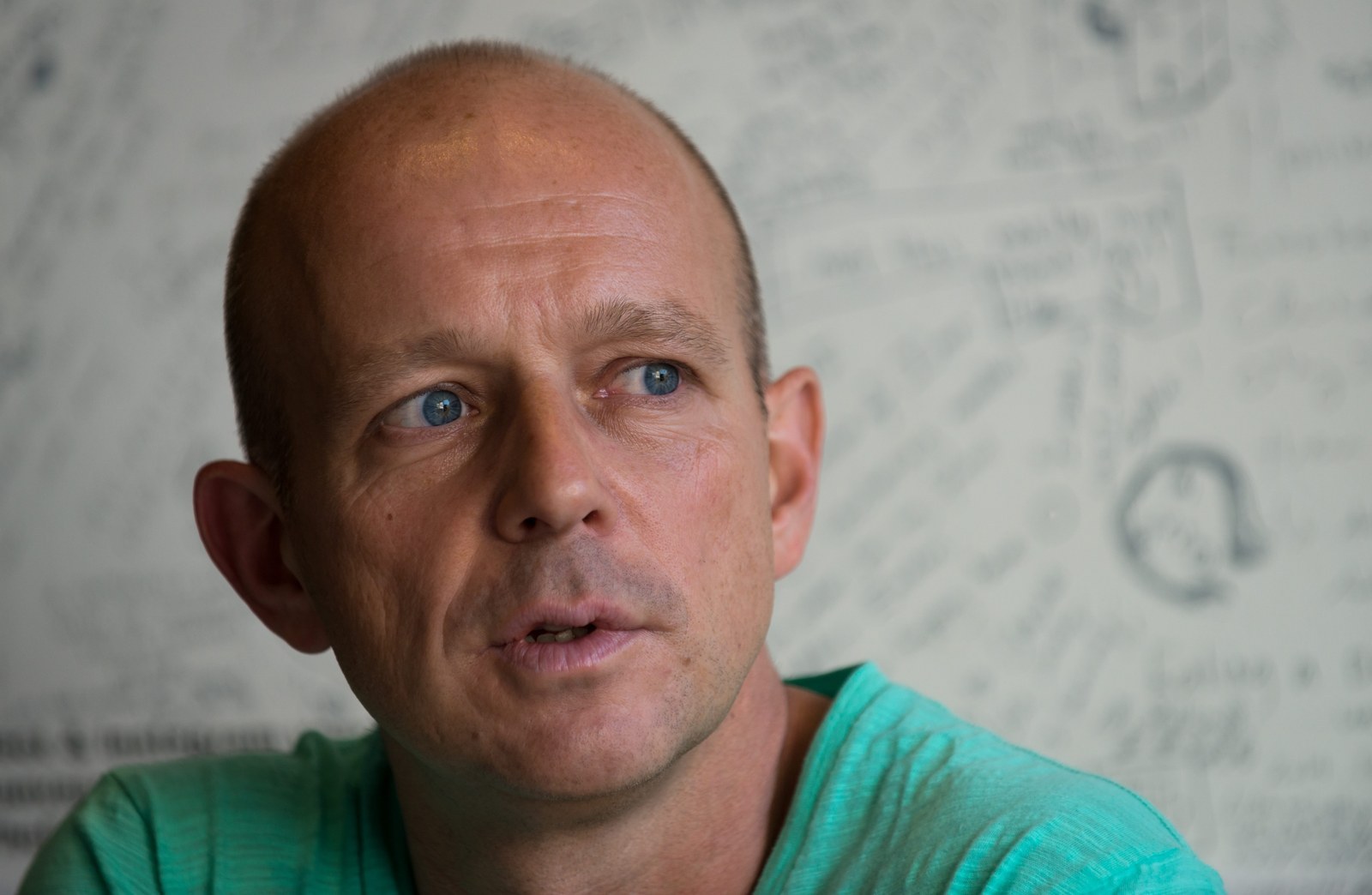The supermarkets are “destructive, inhuman leviathans” which hurt “consumers, employees, suppliers, the marketplace, and society at large”. There is a nexus of “systemic corruption” between big banks and big government. Giant construction firms are “manipulating and lobbying their way to dominance while giving people a worse and worse service”. American politics is so dependent on big money that it “is not in any proper sense of the word a democracy, it is a donocracy”. In short, the whole political system is broken – and the only answer is revolution.
It's the kind of language that might fit comfortably in Russell Brand's recent manifesto, Revolution. Which makes it all the more surprising that it's part of the latest book from the author of the 2010 Tory manifesto.
Sitting in a trendy Shoreditch café, in an aquamarine T-shirt and blue trousers, Steve Hilton seems entirely at ease with himself: tanned, happy, East London hipster meets California tech guru. On the wall behind him the customers have scribbled answers to various questions: “What’s the best thing that’s happened to you today?” “Superhero power?”
But what makes Hilton such a fascinating – and unique – figure is that he's both insider and outsider, hipster and operator. He might have worn a T-shirt to his own book launch, but that launch was attended by the prime minister and half the Cabinet.
Hilton isn't just David Cameron's former senior adviser and director of strategy, the man who rebranded the Tories as kinder, greener, husky-huggers, but one of the PM's closest friends. And his revolutionary, smash-the-system rhetoric isn't a new development: It's stuff he's been saying all along. “That’s why I joke with the prime minister that this book is very helpful”, he says. “Because he can now point to it and say, ‘Look, see, this is what I had to put up with all those years.’”
In government, Hilton became infamous for his big ideas, his sudden rages, his habit of padding around Downing Street in his socks. He not only inspired a character on The Thick of It – shaven-headed bollocks-spouter Stewart Pearson – but his own parody Twitter account, @SteveHiltonGuru, which has racked up more than 10,000 followers.
Defeated by the system, he retreated to California in 2012 to raise his children with his wife, Rachel Whetstone – a senior executive first with Google and now with Uber. But now he's waded back into the debate with More Human, a new hardback whose central thesis is that the giant entities that dominate society – whether government or businesses – have become remote, impersonal, inefficient, and inhumane. And Hilton argues, this can't be fixed be tackling a problem here or a problem there: Rather, we need huge systemic changes.

“People have a sense of a loss of control," he tells BuzzFeed News. "Whether it’s in relation to the way government works generally, or public services specifically, or things that are beyond government, like their interactions with businesses.
"In all these areas, in our lives, people feel like someone else is making decisions that affect me, and I don’t really know who, and I don’t really like the decisions, and I don’t know how to get hold of someone and change things. It’s big and distant and removed from the human scale. And then the next level is, well, what do you do about it?”
For Hilton, the solution is to return life to a human scale – by using technology and the free market to break down big companies as well as big government.
He believes, for example, that schools should serve units of 100–150 people, so that we don’t just have a choice of one good school in our neighbourhood, but 20 or 30, all innovating and diversifying away with the help of the latest online courses.
To halt the animal cruelty inherent in factory farming – which he describes as “an absolute moral outrage” and compares to rape and slavery – he wants to live-stream the view from the shed or processing plant (something he proposed in No 10, to no avail), or force companies to put pictures of where food is actually produced on their packaging rather than bucolic cows and pastures.
Oh, and companies – like the big banks or supermarkets – that have swollen to a scale where they can stamp out competition, not least by bribing government to tip the scales in their favour, should be treated like parts of the public sector and have their salaries restricted, in order to open up the playing field to genuine entrepreneurs.
Above all, however, he wants people to get involved in politics. Whereas Brand, his fellow armchair revolutionary, called on his followers to shun the political system, Hilton insists that it’s the only way to bring about change. “Don’t just write off the political system,” he urges. “Don’t just write off parliament and assume that nothing can happen and that people like me can’t make a difference – no, you can. You can say, ‘It’s not going to happen’ – well, it’s definitely not going to happen if you don’t try.”
But might young people not feel like the system is so stacked against them that there’s no point taking part – for example, when it comes to the state of the housing market, which Hilton agrees is thoroughly broken? On the contrary, he says: If the right people are in power, they can still make change happen. When the coalition government reformed the IT spending rules – which saw 70% of contracts go to just seven giant international firms – "that was achieved in the face of unbelievably fierce lobbying. Microsoft phoned Tory MPs and said, ‘If you let this go through, we will close down our R&D facility in your constituency.’ Direct threats to destroy jobs. But we went and did it anyway, because it was the right thing to do.”

This radical spirit, Hilton insists, still flickers in his friend Dave's breast. “I’m delighted he won,” he says, with real enthusiasm. “I’m so proud of him and what he’s done, and so thrilled that he’s got the chance to lead the government that he wants. Because I think he’s just got such a good sense of the national interest and duty as well as this reforming instinct. I’m really optimistic about the government.”
Of course, the fact that Hilton is not just a friend of Cameron’s, but a paid-up believer, means that there are certain limits to how far he's prepared to go. In power, he complained ceaselessly about how the EU dictated the government’s agenda. In his book, he describes it as “a vast, stinking cesspit of corporate corruption gussied up in the garb of idealistic internationalism”. And in conversation, he brings it up as an example of the toxic collusion between big government and big lobbyists. So he’d vote to leave? I ask.
Instantly, as if sensing the headlines that would result, he begins to backtrack. “Well, I don’t know, because we don’t know what the deal would be. I just don’t want to talk about it, because we’re at the beginning of the process [of renegotiation], and we just have to wait and see.”
Even in less than an hour’s conversation, you can tell what made Hilton such an intriguing – and polarising – figure. His agenda, which is built around transparency, decentralisation, and competition, cuts across conventional party lines with its combination of paternalism and cut-throat capitalism. For example, he argues that businesses should pay a living wage to full-time employees and pay less tax in return: The current system of the state topping up inadequate wages via benefits is, he says in his book, “economic, political, social, moral madness”.
But what about a tech company like Uber – which his wife now works for? It’s driven down the price of taking a taxi, which is great for punters. But it’s also used its market power to drive down the amount it pays to its drivers. “Right,” says Hilton. “But what will happen in the case of companies that are treating their workers in a way the workers don’t like is that someone else will come along and offer something better.” In other words, the free market will provide.
Hilton doesn't exempt the tech firms from criticism: His own book gives the example of Amazon warehouse workers who are tracked by satnav to make sure they use the closest toilet for their loo breaks. "Having GPS tracking to make sure warehouse workers go to the nearest toilet, and if you haven’t you’re reprimanded – that whole story’s very dehumanising,” he agrees. But he says he cited it to illustrate his point about big systems going wrong:
“I don’t believe that anyone decided that, and thought, That would be a great way to treat people. I don’t believe that if Jeff Bezos came face to face with the person who’d gone to the wrong toilet, that he would actually say that. Maybe I’m wrong. But that’s what happens when these big systems get created, you have these inhuman consequences.”

This isn't the only area where Hilton departs from the herd mentality. While everyone else is fixated on the deficit, he claims the real problem is government accounting rules that force us to classify investments in physical infrastructure (broadband, transport, etc) and social infrastructure (parenting classes, early years intervention) as liabilities rather than assets.
"At the moment, we are literally prevented from making the investments that are needed by the system of accounts," he says. "Everyone knows that this stuff pays off down the line. But the government can’t handle that, it can’t actually say, ‘We know that this is a decent investment, because in 20 years’ time it’s going to pay off’. ... It could be reformed, to have something more rational which is based on human priorities. The starting point should be, ‘What needs to be put in place for people to flourish?’”
That’s the Hilton paradox in a nutshell. Even as he argues for the most sweeping reorganisation of the state and society in a generation, he insists that he just wants to make things more “rational”: “This is not some kind of libertarian tract – far from it. I think of it, anyway, as very pragmatic and practical and non-ideological.” He’s also more than happy for other people to come up with their own ideas via his website – and, indeed, to come up with ideas that are better than his own.
And here’s another paradox: that a man who tried and arguably failed to change the system from within is now urging others to do the same: “The one thing I would like to really do something about if I can is to encourage people to run for office," he says. "That’s something I feel very strongly about. To say to people who really care about issues or their community – who have this frustration, who feel angry – OK, great, let’s take that and run for office. It doesn’t matter whether it’s local or national or mayor or whatever.”
Hilton himself, however, won’t be leading the charge, at least not just yet. He’s got another windmill to tilt at back in the US. As founder and CEO of Crowdpac, a Silicon Valley tech start-up, he wants to use better information and better funding tools to prise American politics out of the grip of the few and into the hands of the many.
“The mission is to end the way that big-money donors and the insiders basically control the system, and literally buy the outcome they want from it,” he says. "If we boost the number of small donors, really in a big way, then you end up diluting the influence of the big-money donors."
It may seem like something of a big ask. But if there's one thing you can say about Steve Hilton, it's that he never thinks small.
